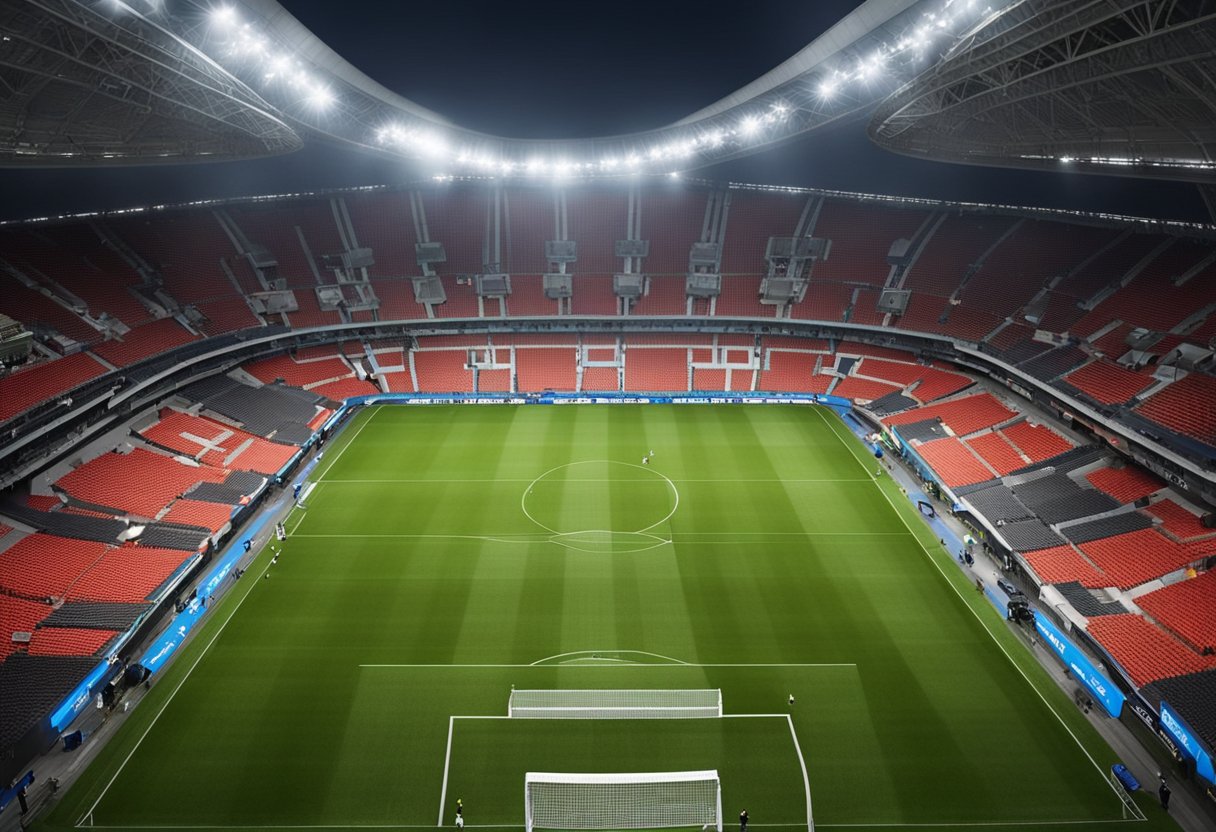How Do Teams Qualify for the UEFA Champions League
How Teams Qualify for the UEFA Champions League: A Clear Guide
The UEFA Champions League is one of the most prestigious club football competitions in the world. Teams from across Europe compete for a chance to lift the coveted trophy and be crowned champions of Europe. But how do teams qualify for this elite tournament?

To begin with, the UEFA Champions League is only open to the top teams from the strongest domestic leagues in Europe. The number of teams each country is allowed to enter is determined by UEFA’s coefficient system, which ranks countries based on the performance of their clubs in European competitions over the past five seasons. The top-ranked countries, such as Spain, England, and Germany, are allowed to enter four teams into the competition, while lower-ranked countries are only allowed one or two.
Once the number of teams from each country has been determined, they must then go through a qualification process to earn their place in the group stage of the competition. This involves several rounds of knockout matches, with the winners progressing to the next round until the final qualifying round. The teams that make it through this process then join the teams that have automatically qualified for the group stage, and the competition begins in earnest.
UEFA Champions League Overview

The UEFA Champions League is an annual club football competition organized by the Union of European Football Associations (UEFA). It is one of the most prestigious club competitions in the world, featuring the top European clubs from various leagues.
The competition was first introduced in 1955 as the European Champion Clubs’ Cup, but was rebranded as the UEFA Champions League in 1992. The tournament consists of several stages, including a group stage, knockout rounds, and a final.
The group stage features 32 teams, divided into eight groups of four teams each. Each team plays six matches, with the top two teams from each group advancing to the knockout rounds. The knockout rounds feature a two-legged format, with the winner determined by aggregate score.
The final is a single match, played at a neutral venue. The winner of the UEFA Champions League qualifies for the UEFA Super Cup and the FIFA Club World Cup.
Qualification for the tournament is based on a team’s performance in their domestic league and cup competitions. The top teams from the top leagues in Europe, such as the English Premier League, Spanish La Liga, and Italian Serie A, qualify automatically for the group stage. Other teams must go through a qualifying round to earn their spot in the competition.
Overall, the UEFA Champions League is a highly competitive and exciting competition, featuring some of the best teams and players in the world.
Direct Qualification Criteria

Domestic League Positions
Teams can earn direct qualification to the UEFA Champions League by finishing within certain positions in their domestic league. The number of spots available for direct qualification varies depending on the league’s coefficient ranking. For example, the top four teams in the English Premier League qualify for the group stage, while the top two teams in the Scottish Premiership qualify for the second qualifying round.
In some cases, the winner of the domestic cup competition may also earn direct qualification to the group stage. This is the case for the winners of the English FA Cup and the Spanish Copa del Rey.
Champions of Top Associations
In addition to domestic league positions, the champions of the top associations also earn direct qualification to the group stage. The top associations are determined by UEFA’s coefficient ranking system, which takes into account the performance of teams from each country in European competitions over the past five seasons.
The champions of the top seven associations (currently England, Spain, Italy, Germany, France, Portugal, and Russia) qualify directly for the group stage. The champions of the associations ranked eight to 15 (currently Ukraine, Belgium, Turkey, Austria, Netherlands, Denmark, Scotland, and Czech Republic) qualify for the second qualifying round.
Overall, direct qualification to the UEFA Champions League is a highly coveted achievement for football clubs across Europe.
Qualifying Rounds and Play-Offs

Preliminary Rounds
Before the actual qualifying rounds, the preliminary rounds take place. These rounds are played between teams from the lowest-ranked UEFA associations. The number of teams that participate in these rounds varies each year, but they usually consist of four teams playing in a single-elimination format. The winners of the preliminary rounds advance to the first qualifying round.
Play-Off Matches
The play-off matches are the final stage of the qualifying rounds, and they determine which teams will advance to the group stage of the Champions League. The play-off matches are played between the winners of the third qualifying round and the teams that finished third in the group stage of the previous season’s Champions League.
The play-off round consists of two legs, with each team playing one leg at home. The team with the highest aggregate score after the two legs will advance to the group stage. In case of a tie, the team with the most away goals will advance. If the number of away goals is also equal, the match will go into extra time and penalties if necessary.
Overall, the qualifying rounds and play-off matches provide an exciting opportunity for teams to earn their place in the prestigious UEFA Champions League.
Coefficient Ranking System

Club Coefficient
The Club Coefficient is a system used by UEFA to rank clubs based on their performance in European competitions over the last five seasons. This coefficient is used to determine which teams qualify for the UEFA Champions League and the UEFA Europa League.
The Club Coefficient is calculated by adding the total number of points earned by a club in the UEFA Champions League and the UEFA Europa League over the last five seasons. The points earned are then divided by the total number of games played by the club in those competitions.
The higher a club’s coefficient, the more likely they are to qualify for the UEFA Champions League. The top four clubs in each country’s coefficient rankings automatically qualify for the group stage of the Champions League.
Country Coefficient
The Country Coefficient is a system used by UEFA to rank countries based on the performance of their clubs in European competitions over the last five seasons. This coefficient is used to determine the number of teams each country can enter into the Champions League and the Europa League.
The Country Coefficient is calculated by adding the total number of points earned by clubs from a country in the UEFA Champions League and the UEFA Europa League over the last five seasons. The points earned are then divided by the total number of games played by clubs from that country in those competitions.
The higher a country’s coefficient, the more teams they are allowed to enter into the Champions League and the Europa League. The top four countries in the coefficient rankings are allowed to enter four teams into the group stage of the Champions League, while the fifth and sixth-ranked countries are allowed to enter three teams.
Overall, the coefficient ranking system is a fair and objective way to determine which teams qualify for the UEFA Champions League and the UEFA Europa League. It rewards consistent performance over a period of time and ensures that the best teams from each country have the opportunity to compete in Europe’s premier club competitions.
Historical Performance Factors

The UEFA Champions League is one of the most prestigious club competitions in the world, and teams must meet certain criteria to qualify for the tournament. Historical performance is one of the factors that UEFA takes into account when determining which teams qualify for the Champions League.
Over the years, UEFA has developed a coefficient system to evaluate the historical performance of clubs in European competitions. The coefficient system takes into account a team’s performance in the Champions League and the Europa League over the last five seasons. The better a team performs in these competitions, the higher their coefficient score will be.
The coefficient system is used to determine the number of teams that each country can send to the Champions League. The countries with the highest coefficient scores are awarded more spots in the competition. For example, the top four associations in the coefficient rankings (currently Spain, England, Italy, and Germany) are awarded four guaranteed spots in the group stage of the Champions League.
In addition to the coefficient system, UEFA also considers a team’s recent performance in their domestic league when determining Champions League qualification. Teams that finish in the top positions of their domestic league are typically awarded a spot in the competition.
Overall, historical performance is an important factor in determining which teams qualify for the UEFA Champions League. The coefficient system and recent domestic league performance are both taken into account when deciding which teams will have the opportunity to compete in one of the most prestigious club competitions in the world.
Changes and Exceptions

The UEFA Champions League has undergone several changes and exceptions over the years. Here are some of the most notable ones:
- Format Changes: The format of the UEFA Champions League has changed several times since its inception in 1955. The most recent format change occurred in 2021, where the number of teams competing increased from 32 to 36. The teams are divided into eight groups of four, and each team plays ten matches in the group stage.
- COVID-19 Pandemic: The COVID-19 pandemic has had a significant impact on the UEFA Champions League. In the 2019-2020 season, the tournament was suspended for several months due to the pandemic. The remaining matches were played in a single-elimination format in Lisbon, Portugal.
- Exceptional Qualification: In some cases, teams that do not finish in the top four of their domestic league can still qualify for the UEFA Champions League. For example, the winner of the UEFA Europa League automatically qualifies for the following season’s Champions League. Additionally, teams from smaller leagues can qualify for the tournament through the Champions League play-offs.
- Financial Fair Play: UEFA has introduced Financial Fair Play regulations to ensure that clubs do not spend more than they earn. Under these regulations, clubs that fail to comply can be banned from participating in the Champions League. In 2020, Manchester City was banned from the tournament for two seasons for breaching these regulations. However, the ban was later overturned on appeal.
Overall, the UEFA Champions League continues to evolve and adapt to changing circumstances. These changes and exceptions ensure that the tournament remains competitive and exciting for fans around the world.







